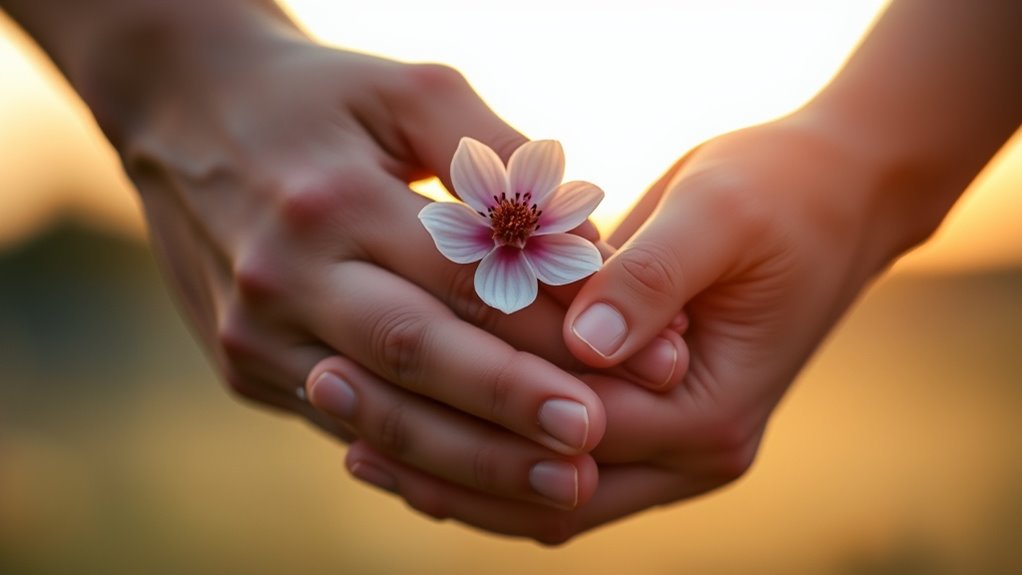To heal from love addiction without sabotaging your relationship, focus on building self-awareness and developing a strong, independent sense of self. Recognize your patterns of emotional dependency and work on cultivating self-compassion. Set healthy boundaries and improve your emotional security to reduce clinginess. Strengthening your identity outside the partnership fosters confidence and balance. If you want to learn more about creating lasting change while preserving your relationship, there’s much more to explore.
Key Takeaways
- Cultivate self-awareness and self-compassion to understand and address attachment patterns without blame.
- Develop a strong, independent sense of self through self-care and personal growth activities.
- Recognize and modify insecure attachment behaviors to reduce clinginess and foster healthy boundaries.
- Communicate openly with your partner about your needs and boundaries to prevent misunderstandings.
- Focus on building emotional security within yourself to avoid reliance on the relationship for validation.

Love addiction can feel overwhelming, but healing is possible when you recognize the patterns and take intentional steps toward recovery. One of the key factors in understanding love addiction is emotional dependency. When you’re emotionally dependent, you seek constant reassurance and validation from your partner, often feeling anxious or unsettled if those needs aren’t met. This dependency can create a cycle where your self-worth becomes tied to your partner’s attention and affection, making it difficult to maintain a healthy balance in your relationship. Recognizing this pattern is essential because it helps you understand why you may cling tightly or feel desperate when connection feels threatened. It’s also important to explore your attachment styles—how you relate to others based on your early life experiences. For example, if you have an anxious attachment style, you might fear abandonment and go to great lengths to keep your partner close, even at your own expense. Understanding your attachment style offers insight into your emotional responses and behaviors, enabling you to address them consciously. Additionally, examining personality traits associated with attachment can help you develop healthier relationship patterns. Healing begins with becoming aware of these underlying patterns. Instead of blaming yourself, acknowledge that your attachment style and emotional dependency developed as adaptations to your past. This awareness empowers you to change the narrative you tell yourself about love and worth. It’s essential to work on building a sense of self outside of your relationship, cultivating self-compassion and confidence that aren’t dependent on external validation. This might involve setting boundaries, practicing self-care, and engaging in activities that foster your independence. As you become more secure in your own identity, you’ll notice a decrease in the frantic need for reassurance, which can help prevent your love addiction from sabotaging your relationship.
Frequently Asked Questions
How Can I Recognize if I Have Love Addiction?
You might have love addiction if you notice emotional dependency driving your actions and you cling to relationships even when they’re unhealthy. Pay attention to your attachment styles—do you fear abandonment or seek constant reassurance? If your happiness hinges on a partner’s presence and you struggle to set boundaries, these are signs. Recognizing these patterns is the first step toward healing without sabotaging your relationship.
What Are Early Signs of Love Addiction?
Early signs of love addiction include feeling emotionally dependent on your partner and struggling with attachment styles that create anxiety or clinginess. You might prioritize their needs over yours constantly, fear abandonment, or seek validation through your relationship. These behaviors often stem from insecure attachment styles and emotional dependency, making it hard to feel secure on your own. Recognizing these signs is the first step toward healthier, balanced relationships.
Can Love Addiction Be Cured Without Therapy?
Think of love addiction as a stubborn dial-up connection—you can attempt to fix it without therapy. While therapy often helps, you can work on emotional dependency through self-awareness strategies like journaling, setting boundaries, and practicing mindfulness. These tools help you understand your patterns, rebuild self-esteem, and foster healthier relationships. However, if issues persist, seeking professional help remains a wise choice for sustainable healing and growth.
How Does Love Addiction Differ From Healthy Attachment?
Love addiction differs from healthy attachment because it’s rooted in codependency patterns and emotional dependency. You might find yourself overly anxious, obsessing over your partner’s approval, or sacrificing your needs. Unlike secure attachment, which is built on trust and mutual respect, love addiction often causes you to cling or feel empty without your partner. Recognizing these patterns helps you develop healthier boundaries and emotional independence.
What Are Practical Steps to Prevent Relapsing Into Love Addiction?
To prevent relapsing into love addiction, prioritize self-care strategies like regular exercise, mindfulness, and healthy hobbies. Set clear boundaries to protect your emotional well-being, such as limiting time with overly dependent partners or avoiding codependent behaviors. Stay aware of warning signs, like obsession or anxiety, and seek support from a therapist or support group. Consistently practicing these steps helps you maintain balance and foster healthier relationships.
Conclusion
Healing from love addiction is possible when you recognize your patterns and prioritize self-care. Remember, studies show that about 10% of the population struggles with love addiction, highlighting how common this challenge is. By focusing on personal growth and setting healthy boundaries, you can rebuild trust in yourself and your relationships. Keep in mind, healing is a journey—be patient, stay committed, and trust that healthier, more fulfilling connections are within your reach.









